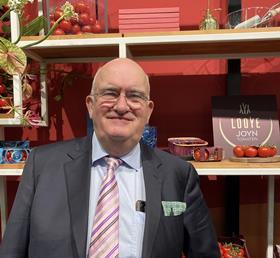The high price point of Dutch producer Looye Kwekers’ premium tomatoes raises expectations, but the company’s commitment to delivering the best taste means consumers should never be disappointed
Ever since its inception in 1946, Dutch tomato grower and marketer Looye Kwekers has had the desire and the will to grow the tastiest tomatoes in the world, aiming always for the perfect balance between sweetness and acidity. The highest quality tomatoes in the company’s greenhouses are sold under the company’s premium brands, Honeytomatoes (Honingtomaten) and Looye Joyn tomatoes, with those that just miss out marketed under a separate label, including the Dulcita and Cortez brands.

“There are customers for all kinds of tomatoes,” says the company’s Jos Looije, son of founder Jacobus Looije. “If you’re a consumer on a budget and you don’t want to spend too much money, you will of course buy cheaper tomatoes. But we focus on taste. Looye is not huge in terms of volumes, but the value is high. We try to give our brands a unique identity, and we invest in marketing them.”
Looye Kwekers produces two varieties, cherry tomato Piccolo and vine tomato Avelantino. The best of the former are sold under Honeytomatoes, the latter under Looye Joyn. “Besides a beautiful design and very good branding, we make sure our tomatoes packed under Honeytomatoes taste the best and look the best,” says Margriet Looije, commercial director and daughter of Jos.
The company’s fixed price strategy ensures consumers are not put off by frequently fluctuating prices, including in the winter months. “We want to be available in the winter because that’s important for our brand strategy,” she says. “We choose not always what’s best in the short term financially, but what’s best in the long term.”
According to Looye, many fruit and vegetables are currently undervalued compared with unhealthy foods. Although the price of Honeytomatoes may make them a little too steep for many consumers to buy each week, that is not the company’s core strategy.

“We don’t expect consumers to always buy our tomatoes,” says Jos Looije. “We actually don’t want everybody to buy our tomatoes all the time because then we wouldn’t have enough of them! When we started out, we considered what kinds of consumers would be our target, such as people living in cities who like to cook. But what we actually saw was a lot of grandparents buying them for their grandchildren. Grandparents like to give their grandchildren something tasty and healthy, and when they buy our tomatoes, the kids eat them and enjoy them because they are so delicious.
“Our job is to make sure that the consumer is not disappointed. Their expectations are understandably high, as they pay a lot of money for our product, so they have to get the taste they expect, and we are able to deliver that.”
Margriet Looije will be speaking at the Global Tomato Congress on 14 May in the Hague about how to communicate the taste and other benefits of tomatoes direct to consumers. Check out the full programme here.



